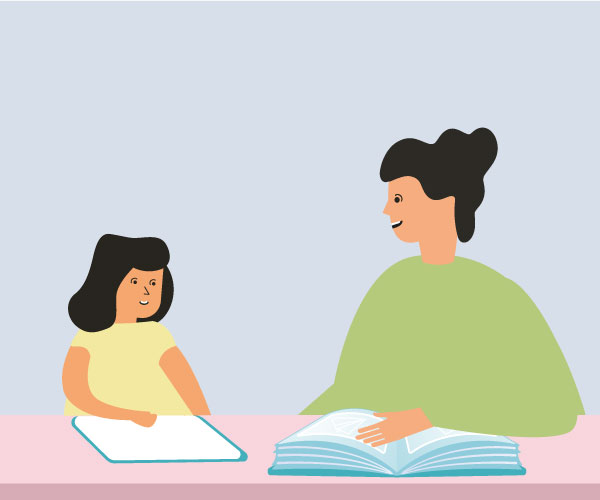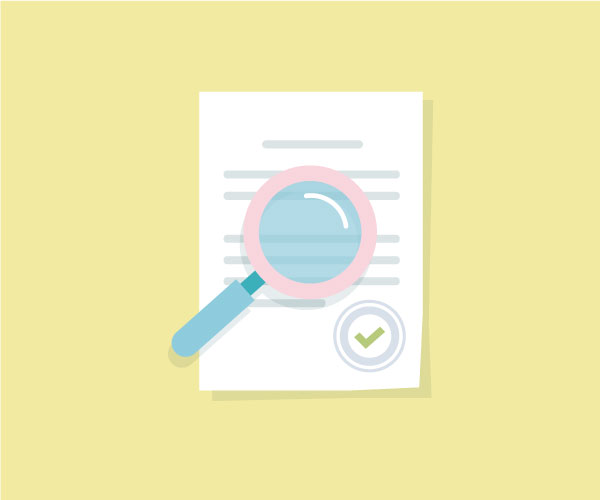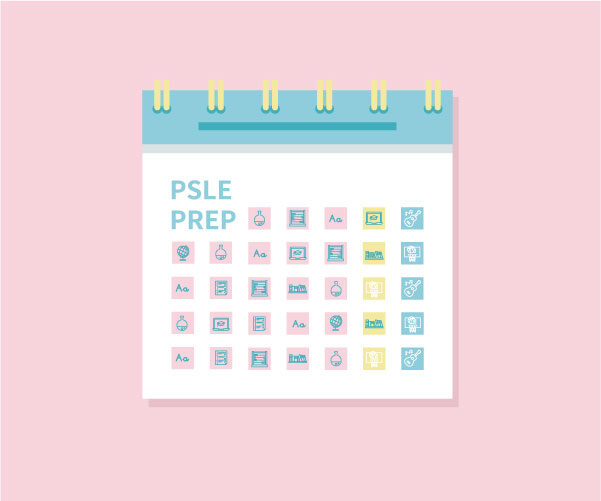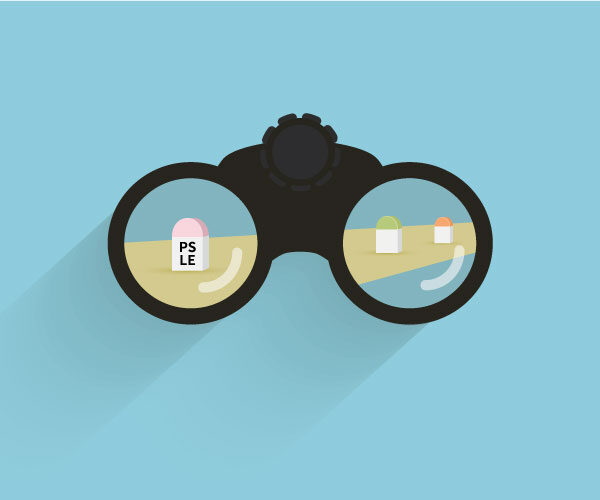
The Primary School Leaving Examination (PSLE) is a huge milestone in your child’s academic journey.
At this juncture, it is important for you and your child to have a solid PSLE preparation plan. Making sure your child has everything they need in the lead-up to PSLE will allow them to focus on productive learning and effective revision.
We spoke with Mrs Joyce Simpson, Academic Director The Learning Lab United Square, who shared important tips on how parents can effectively prepare their children for the PSLE exam.

1. Develop a Study Plan with Your Child
Having a study plan for the PSLE helps your child prioritise tasks and allows them to see where their effort is going. If you're uncertain on how to help your child effectively study for the PSLE, consider these tips:
For each subject, make a list of the topics covered in the exam. Subjects such as Maths and Science can be further broken down into their individual components, such as mastering algebra. When revising for specific language components like English Composition, your child should write excellent characterisation, five senses description and show-not-tell phrases to use in their next composition.
While going through his or her PSLE study plan, your child should feel confident about the standard method of answering questions on various topics. If he or she feels unsure, encourage your child to consider what needs to be done in order to feel more confident about his or her knowledge of that topic.

2. Set a Momentum to Revision
During the PSLE preparation, doing practice papers will help familiarise your child with the examination format and ensure that he or she is able to use his or her time effectively within a limited time period. Practice papers can also help your child identify areas that need more attention during revision.
Try to simulate PSLE exam conditions when your child attempts these practice papers.
Studies have shown higher information retention rates in those who regularly self-test compared to those who do not.
As a parent, you can act as an invigilator and make sure that your child does not have any distractions while completing each practice paper. Don't forget to ask your child to take note of the questions that he or she has trouble with so that both of you can consult his or her teacher.

3. Anticipate What's Ahead
As part of your child’s PSLE exam preparation, it’s wise to stay a step ahead. During each term break, such as the upcoming March holidays, encourage your child to look through past-year exam papers to familiarise themselves with the common questions that are tested.
The school holidays are the best time for your child to get as much revision done as possible. Your child can also compile various concept maps, study guides and revision notes during this time.
The Learning Lab is now at locations. Find a location that suits your needs.
If you have any questions about our range of programmes or class schedules, you may contact us at 6733 8711 or drop us an email at enquiry@thelearninglab.com.sg.

4. Establish Clear Goals
Establishing the relationship between studying hard and getting good grades is a key component of intrinsically motivating student learning. In a nurturing and encouraging manner, ask your child what his or her aspirations are so your child has a clear focus when working towards achieving those goals.

5. Engage in Positive Visualisation
Visualising a positive exam experience with your child is helpful. This can also include reflecting on excellent performance during mock paper practices. What helped your child to do well, and how can they apply the same skills during the actual PSLE exams? Perhaps they practised good time management and had ample time to check their work thoroughly.
By encouraging your child to think about a previous good performance, you can boost his or her confidence, dispel the fear of failure and reduce exam anxiety.

6. Enhance Learning Through Structured Programmes
At The Learning Lab, we believe that achieving PSLE excellence begins with having a systematic plan. Providing your child with the right academic support can make all the difference.
See how TLL can help your child to score well or even ace in the upcoming PSLE exams:
At The Learning Lab, we believe that achieving PSLE excellence begins with having a systematic plan that:
takes your child’s learning needs into consideration
helps him or her to build up a steady momentum in order to peak at the PSLE
This is how TLL will help your Primary 6 child.
i. Our Primary 6 Core Programmes:
The anchor of our Primary 6 student experience is a strong and solid curriculum. Whether it's consolidating knowledge or learning how to apply exam-centric skills, our Primary 6 programmes place a strong emphasis on helping your child develop key knowledge, skills and dispositions so he or she may be better prepared for the major national exam.
ii. PSLE Preparation Classes:
As part of our enhanced PSLE preparation plan, core programmes include PSLE Preparation Programme sessions to boost your child’s PSLE revision. Lessons during these booster classes will include helping your child to affirm positive mindsets to handle exam pressure effectively as well as to develop well-paced study and revision plans.
iii. TLL.360, TLL's Online Learning Platform:
TLL.360, our online learning and revision platform, complements classroom teaching by providing your child with opportunities to learn in more flexible and personalised ways.
Learn more on how we can help here.
Our Primary 6 Core Programmes
The anchor of our Primary 6 student experience is a strong and solid curriculum. Whether it's consolidating knowledge or learning how to apply exam-centric skills, our Primary 6 programmes place a strong emphasis on helping your child develop key knowledge, skills and dispositions so he or she may be better prepared for the PSLE exam.
PSLE Preparation Programme (PPP)
Our core programmes include PSLE Preparation Programme sessions to boost your child’s PSLE revision. Lessons during these booster classes will include consolidating knowledge and mastery of the topics and skills tested for English, Maths, and Science in the PSLE. These classes will also help your child to affirm positive mindsets to handle exam pressure effectively, develop well-paced study and revision plans.

7. Get Ample Rest
Getting enough sleep is important for your child. Sleep is deeply connected to our learning process. Without enough sleep, students have a harder time retaining and recalling the information they have learnt.
In addition, adequate sleep (at least nine to 12 hours) keeps your child’s immune system strong—so try to avoid those late-night cram sessions. They might do more harm than good. Remember, a well-rested mind is more prepared to absorb knowledge and confidently tackle the challenges of the PSLE exam.

8. Look beyond the PSLE
A final PSLE tip for success is to discuss your child's aspirations with them. What is his or her desired choice of secondary school, dream university, or job? By setting these targets together, your child will subtly reinforce the importance of developing a PSLE study plan and actively engaging in it to achieve those goals.
Get Your Child PSLE Ready with Us
Empower your child's academic journey with The Learning Lab's tailored PSLE preparation tips. Our holistic approach ensures mastery, confidence, and a love for learning. From personalised study plans to strategic revision techniques and beyond, we're here to guide and support you in navigating your child’s academic success. Enrol your child at The Learning Lab.
Registration for our Primary 6 programmes is ongoing. We’d love for your child to join us for a fulfilling and enriching learning journey.
The Learning Lab is now at locations. Find a location that suits your needs.
If you have any questions about our range of programmes or class schedules, you may fill in the form below or contact us at 67338711 or enquiry@thelearninglab.com.sg.
Resources to Excel in the PSLE
Unlock more PSLE tips with TLL’s additional learning resources to support you and your child through the preparation process.
5 Things Your Child Can Do To Score Well For The PSLE Situational Writing
Transform situational writing from a hurdle to a high score on your child's PSLE. Discover TLL's five essential strategies for crafting responses that resonate and impress.
Challenging PSLE Science Questions And How To Tackle Them
Even the most complex PSLE Science exam questions can become manageable. Learn the art of breaking down and conquering these challenges with TLL.
Common Careless Mistakes Students Make In The PSLE Maths Paper And How To Avoid Them
Mistakes are a part of learning, but during the PSLE Maths exams, they can cost dearly. Uncover how to minimise these common slip-ups.


